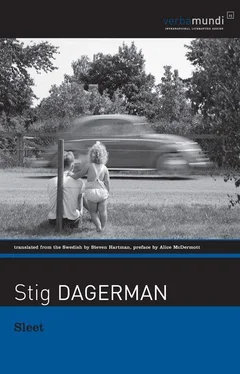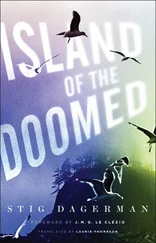“Mr. Ekman, can you tell us what the two parties on the left were called?”
With one exception every eye in the room turned to Ekman. He’d grabbed hold of the outer corners of his desktop in a kind of white-knuckled desperation. He swallowed and swallowed again, all the while staring into the middle of his desktop as into another’s eyes. At last he managed to find his voice.
“The Gironde party … and … and …”
Our teacher looked out at the snow. We looked at Ekman, curious, heartless, powerless. But Ekman took no notice of us. He was aware only of himself. His hands were as white now as his face. Finally he managed something like a whisper.
“… and the Montessori party.”
Then we all looked at each other, the other seven of us. And suddenly Larsson, the hockey player, burst out with a laugh, and Wikman, the class monitor, started giggling. Some of us smiled. Ekman had gotten the words mixed up, not realizing that Montessori wasn’t even French. It was funny, but my own laughter got caught in my throat the moment Ekman looked directly at me. He was imploring me for help with his eyes and the only help I could offer was not to laugh in his face. That’s how paltry a person can be. That’s how paltry I was.
Mr. Lind did not turn to us until the room had grown very quiet. Never before had he looked so dejected. Never before had he seemed so small, so dark.
“La Montagne,” he said in a low voice laced with grief.
In that moment I noticed a strange similarity between Ekman and Mr. Lind. Both sat looking down at their desks, with their hands knotted tight in front of them, as if their muscles were cramping. And their anguish wore the same face.
But this anguish was cut short by the bell. All at once shadows began to dart across the frosted glass of the door and a cascade of sound washed down the stairs to drown us out. We rose up, all of us, and went out into the silent snow.
Gym was scheduled at one o’clock that day, and Ekman and I both had exemptions. We used to roam around town during that free hour looking at trains or boats. Or we’d sit on a bench at the cemetery if it was nice out, and I’d read poems out loud that Ekman didn’t really get. But since it was cold and snowing, we stayed inside the classroom. We only had art class left that afternoon, so he didn’t need to read anything, and with nothing left to fear that day he could be my friend.
At first we stood for a while by the window and looked out at the living wall of snowfall. Some piles of wood stacked high, deep inside the swirling snow, reminded me for some reason of ships at sea. At some point Ekman left my side and then I heard keys jingling near the door. To my great surprise I heard a key slide into the door, and so I turned around quickly.
“Why are you locking the door?” I asked him.
Ekman stood there in front of the door. In his meager outstretched hands was the chess set, as if he were presenting a gift.
“I thought we could play a game of pocket chess,” he said timidly. “And just in case somebody came …”
We pushed the desks together, letting the chess set straddle the crack, and then we sat down to play. I was white and opened with my pawn. The door was still locked. What harm would it do? I managed to get both my knights out without losing either, and right away they scared Ekman. The pieces were too small and they kept slipping out of his trembling fingers. I noticed then that he’d mixed up one of his knights with his bishop when he set up his side. I gave in to the impulse to hassle him a little because he was so anxious.
“You don’t have to be afraid of me,” I said sarcastically and switched the pieces back to their right places.
His face flushed red.
“I didn’t do it on purpose,” he whispered. It was his turn now and he needed to do something about my rook, which was blocking his best moves.
But just then we heard something out in the hall, the clatter of someone’s shoes echoing between the walls. Then it fell silent. Whoever it was out there was now standing right outside the door to our homeroom, even taking hold of the door knob. A key slid into the lock with a swiftness that was almost unimaginable and then suddenly there stood Mr. Lind in the doorway blinking at us. I looked right back at him. I hadn’t done anything wrong. There was nothing wrong with playing chess during a free period. In any case, he moved slowly toward us and raised his hand a bit to signal we should stay seated. Then he stopped right beside our desks and looked down at us with an oddly unfamiliar expression.
“What are you doing here?” he asked us in a low tone.
That may have been the first direct question Mr. Lind had asked me that entire term, and it actually caught me a bit off guard, so Ekman answered before I had a chance.
“We — we weren’t doing anything!” he stammered.
“We’re playing chess,” I said.
“Chess?” said Mr. Lind.
And I really couldn’t understand why he sounded so surprised. And I couldn’t grasp why he wasn’t looking at us now. Instead, his eyes settled on our desktops with a kind of perplexed and wounded look.
I felt compelled to look there myself.
The chess set was gone. Ekman must have stashed it away in his pocket before Lind stepped into the room. Suddenly Mr. Lind was gone too, now standing at the window with his back to us. Cutting us off.
“It’s not good for you to sit inside like this,” he said. “It’s better for you to go outside.” And then, after a moment, he thought twice in his Lindian way: “Though it is snowing.”
Then he turned again and passed right by us, leaving without a word, without even a look. Quietly we pulled the desks apart, went down the stairs, pushed open the doors with our shoulders and stepped out into the swirling snow. In the lee of the wood stacks, we continued our game. Just before two o’clock, I brought the game to check and mate with my knights and queen. The snow whistled around us and there in the midst of it we were alone. Something occurred to me then, something I wanted to ask Ekman. But again he got there ahead of me. Standing back further in the lee of the wood stack than me, he suddenly looked frightened again, so he leaned in closer toward me and asked:
“Do you think he saw the chess set?”
“No,” I said. “I don’t think so.”
“OK, then,” he said and breathed out with an obvious look of relief.
Later that evening he called me at home and asked me the same thing again.
There was as much snow the next morning. Cars were knee-deep in it, and balcony doors were impossible to open. The streets were barely recognizable. Otherwise the day began as just another ordinary morning with Lind leading us in prayers. And when he came in to our first class — this time to lecture us on Christianity — everything followed the same fairly typical routine as he meandered through the room and talked to us. At his usual intervals he paused, speaking to each of us in turn, and in a moment or two it would be my turn. My desk was closest to the window, so I was always the last one Mr. Lind would address before Ekman. Today I was looking forward to it because I knew my psalms cold, and I had even made an extra effort to be well prepared. I kind of felt like I had a debt to repay. And Ekman must have felt the same.
So when Lind turned around at the door and slowly walked back along the row of desks, I was already smiling in anticipation of my turn. But I smiled too soon, because then something happened that caught me completely off guard. Lind went right on by me without stopping, and then he paused at the window and stood there for an interminable moment with his back to us — or, rather, with his back to me. Mystified, I turned to Ekman, but he hadn’t even noticed, probably because he was too preoccupied thinking about how it would be his turn next.
Читать дальше












